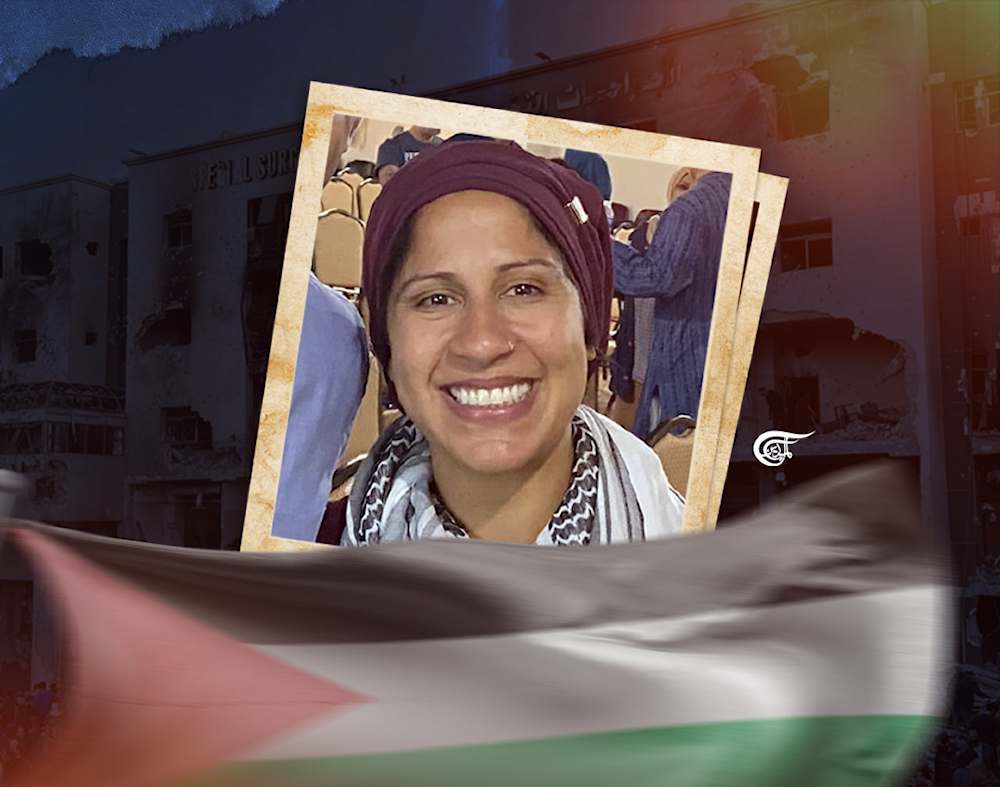Interview with Doctor Pachiyannakis on Gaza, ongoing genocide
Dr. Thalia Pachiyannakis, an OB-GYN doctor in South Bend, Indiana, returns from volunteering in Gaza, explaining that upon arrival in Gaza, the only sight is that of destruction.
-

Doctor Pachiyannakis reflects on her experience as a volunteer in Gaza (Illustrated by Ali al-Hadi Shmeiss; Al Mayadeen English)
Dr. Thalia Pachiyannakis, an OB-GYN doctor in South Bend, Indiana, recently returned from a stint volunteering in the besieged Gaza Strip. Dr. Pachiyannakis has called on the US government to force "Israel" into a ceasefire and is also urging for an international arms embargo against the Zionist regime.
She explained that upon arrival in Gaza, the only sight is that of destruction. The doctors she was with had to travel in a UN convoy so as not to be targeted by Zionist warplanes and drones, although even then, this carried risks. She explained that children, doctors, and most people are sick all the time with diarrhea, hepatitis A, and other diseases. There is no soap in the hospital, and when women give birth, they are given a single Tylenol to manage their pain.
Bursting into tears, Dr. Pachiyannakis explained the lives of the doctors she worked with at the Nasser Medical Complex. She worked with two doctors held hostage by the Zionist Wehrmacht and told the crowd their story. They told her of their torture and the torture of the patients during the Zionist raid on the hospital. This is the same hospital where a mass grave of 300 Palestinians was found in April.
She also mentioned intentional and systematic beatings and amputations by Zionist doctors on Palestinians held in captivity. The anesthesiologist she worked with was given one piece of bread a day in prison, was beaten, and was allowed to take one cold shower a day. Another doctor was beaten for 12 hours straight for offering support to another detainee who was injured. Along with reports of mass rapes by the IOF, Dr. Pachiyannakis’s story depicts a harrowing picture of life in Gaza.
Nevertheless, she also took the time to show photos of her and other doctors and nurses smiling, laughing, and taking much-needed breaks for a few minutes. She described the generosity and steadfastness of the Palestinian people in the face of such calamity. The thing she was impressed with the most is the deen (strong belief in God) of the Palestinian people and their refusal to submit to Zionist torture and genocide.
Before Dr. Pachiyannakis gave a report to the community on her time in Gaza, we sat down for an interview outside the local masjid.
HE: What made you decide to go to Gaza?
TP: I have always wanted to do humanitarian work. One of my friends inspired me… we did residency together in Flint, Michigan. She went to Gaza, which was inspiring. When she said she was going again, I decided to join in.
HE: What were the conditions like in the hospital you worked in?
TP: We were in the Nasser Medical Complex… the conditions were extremely bad. The hospital was invaded in February, and much was destroyed. This is the same hospital where they found the mass grave of 300 people in April. After two months, [Palestinians] moved back into the hospital only to find out that everything was destroyed. There were about 1000 cats living in the hospital. You can imagine what they had to pick up in order to reopen the hospital. I went there, in June and although it was a functioning hospital, it had limited medical supplies. There were dirty surgical instruments, no soap, one pair of scrubs per doctor, and patients coming in dirty.
HE: How many doctors from abroad are in Gaza right now?
TP: There were quite a few doctors from the Emirati Hospital working in Nasser. There were doctors, but the real problem is the lack of medical supplies. There's not much you can do without machines to monitor babies. You can also imagine the situation given that none of these doctors and medical staff have been paid for 9 months. They’re all living in tents, and some of them have to walk for hours to get to the hospital.
HE: As an OB-GYN, what is the condition of women in the Gaza Strip? How many deliveries are happening?
TP: There were about 30-50 deliveries per day. There was a total lack of prenatal care, because, without proper transportation, some patients took one or maybe three hours to get to the hospital. There was no monitoring, so if a patient came in while in labor, they only had one non-stress testing machine, which would lead to stillbirths or we would do a c-section if we thought the baby had bad heart tones because we had quite a few. We had two fetal deaths in one week when I was there. The patients are all dehydrated, and there is no sanitation at home or in the hospital. Patients who had c-sections would come back with severely infected wounds and be admitted to the ICU. There was no pain medication, so patients were delivering or having c-sections with no pain treatment. Even after a major surgery, they would get one Tylenol.
HE: What is your message to other doctors in countries who are funding the ongoing genocide?
TP: I don’t understand how people can be quiet. I don't understand how this isn't the only thing people are talking about. We have innocent people being murdered by the 100s. I was there. There’s only civilians suffering. It has only escalated since I left. One would think it would slow down, but it has only escalated. The day I left, [the Zionists] hit al-Mawasi, which is right next to where I was staying. It could have been me. One hundred people died that day and three hundred were injured. The Nasser hospital was already overwhelmed. Yet it continues, when is it going to end? There needs to be a ceasefire and an arms embargo.
HE: One final question: much of the Western media has reproduced Zionist propaganda uncritically, and because you were there, I must ask: are these hospitals being used as Hamas bases? Did you see any Palestinian Resistance fighters in the hospitals?
TP: No. The only threat to me, the patients, and the doctors in the hospitals are the Israelis. There are drones flying constantly, jets flying overhead, bombs dropping, and gunfire all the time. There were no tunnels connected to the hospitals. The hospital is not being used as a base by Hamas or any other group. Yet, when the Israelis took over the Nasser hospital, they tortured Palestinian doctors and patients.

 Hanna Eid
Hanna Eid
 6 Min Read
6 Min Read











